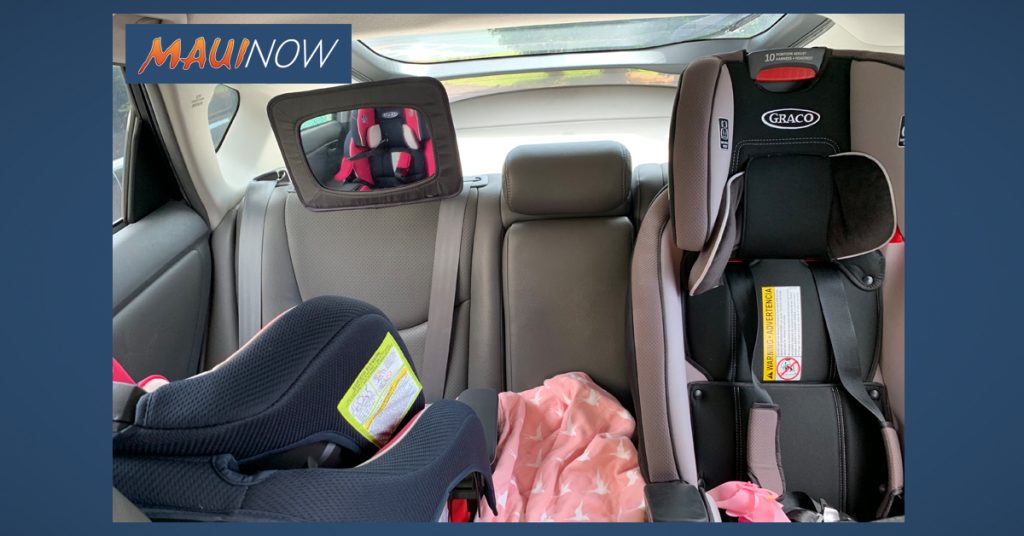Hawai‘i Police Issue Reminder: “Check for Baby”
The Hawai’i Police Department is asking for the public’s help in reminding friends and family to be sure to “Check for Baby” when operating a vehicle and especially when exiting a parked vehicle.
According to the National Highway Traffic Safety Administration children dying from heatstroke in cars, either because they were left or became trapped, have reached a record number. According to the NHTSA, “52 children lost their lives in 2018—the most in over 20 years.”
So far this year there have been 11 such deaths, with the most recent being a 3-month-old girl in an incident reported on June 8 in Butler County, KS. *(The information was compiled by by Jan Null, CCM
Department of Meteorology & Climate Science San Jose State University and published at www.noheatstroke.org). All of the cases so far this year have happened outside of Hawaiʻi on the mainland.
In Hawaiʻi, there have been five such deaths over the 20 year period from 1998 to 2018, including one on Maui in 2014.
Just last month on May 5, a two year old girl was taken to the hospital in critical condition after being left unattended in a vehicle for almost two hours in Kona on Hawaiʻi Island. Police said the father reported that the family had been shopping, and he dropped them off at home not realizing his baby daughter was asleep in the vehicle as he went on to work.

Maui Now.
Three of the five documented Hawaiʻi cases involved a child that was apparently left in the car. One involved a child that was reportedly found in the trunk of a relative’s car. And in the Maui case, the parent reportedly told police that the girl likely went into the car to get her blanket.
- Aug. 29, 2014: 4-year-old, Lahaina, Maui
- July 18, 2009: 4-year-old, ʻEwa Beach, Oʻahu
- March 17, 2007: 3-year-old, Honolulu, Oʻahu
- Feb. 5, 2004: 1-year-old, Honolulu, Oʻahu. (Parents recount the day their life changed).
- Oct.13, 2003: 10-month-old, Honolulu, Oʻahu
The NHTSA notes that an outside temperature in the mid-60s can cause a vehicle’s inside temperature to rise above 110 degrees Fahrenheit. According to the agency, the inside temperature of a car can rise almost 20 degrees Fahrenheit within the first 10 minutes.
“Leaving the windows opened slightly does not significantly slow the heating process or decrease the maximum temperature attained,” according to a study published in Pediatrics, the official Journal of the American Academy of Pediatrics. The study further noted that, “Increased public awareness and parental education of heat rise in motor vehicles may reduce the incidence of hyperthermia death and improve child passenger safety.”
There’s already been two days this week with record temperatures recorded in Kahului, Maui. On Monday, June 17, 2019, a record high of 94 degrees was set at Kahului Airport, breaking the old record of 93 set for the same day in 1953. And yesterday, a record high temperature of 92 degrees, ties the old record set for the same day in 1969.
More than half of vehicular heatstroke cases from 1998 to 2018 were because an adult forgot about a child, according to NoHeatstroke.org. Trends the group discovered in these incidents included:
- About 44% of the time, the caregiver meant to drop the child off at daycare or preschool.
- The end of the workweek—Thursdays and Fridays—saw the highest number of deaths.
Advocates for child safety want to issue a reminder to “keep alert, avoid distractions, and put safeguards in place,” so a child is never unknowningly left in a vehicle.
Tips for Adults With Kids in the Car
*Provided NHTSA
- Place a briefcase, purse, or cell phone next to the child’s car seat so that you’ll always check the back seat before leaving the car.
- Keep a stuffed animal or another memento in your child’s car seat when it’s empty. Move it to the front seat as a visual reminder when your child is in the back seat.
- Set a rule for your child care provider; have them call you if your child doesn’t arrive as scheduled.
Advocates for child safety say “life can be very busy nowadays. It only takes being distracted for a moment or a change in a normal routine to set up a potentially dangerous situation for a child.”









